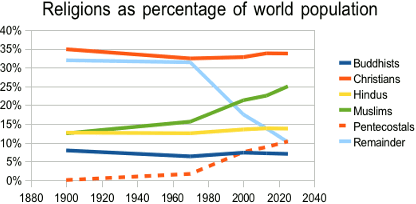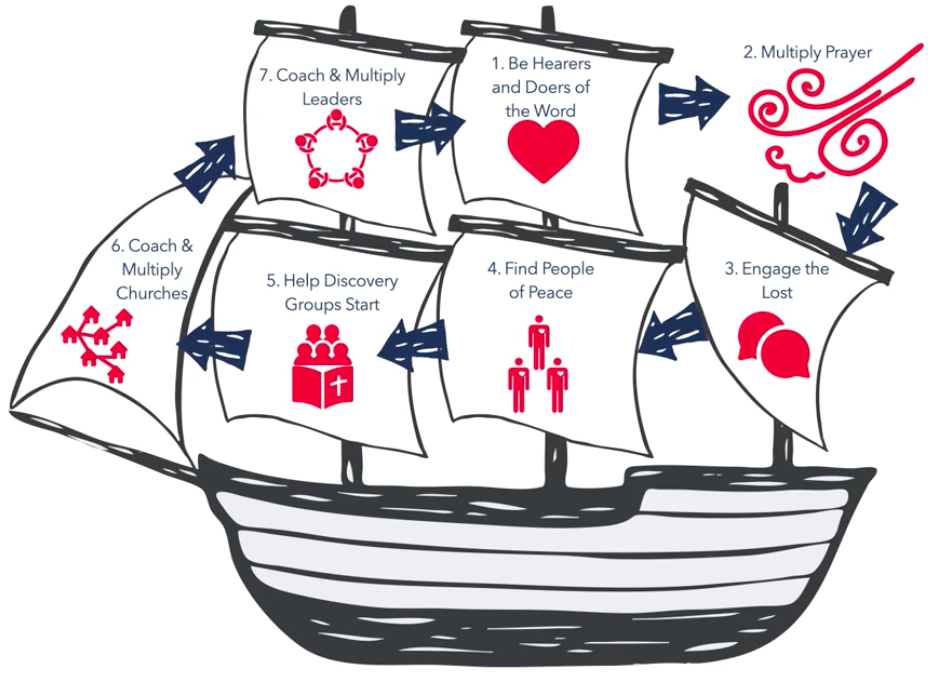 sunrise from Silver Peak, Catalina Island
sunrise from Silver Peak, Catalina Island
Disciple-Making Movements:
History in the Making
Quick Links: DBS • DBS Story Sets • Prayer • solo Bible study • LTGs
What they are, how they work, what God is doing, and how to get involved or learn more.
For years I have been increasingly fascinated and encouraged by the exponential growth of robust communities of disciples who multiply. Learning about what God is doing in many millions of lives in thousands of different areas and contexts has taken me to online and printed resources, as well as abroad to see first-hand. And I'm seeing both church history and world history in the making. Here is a tour and key resources.
'Miraculous Movements'
Disciple Making Movements (DMMs) are emerging worldwide that involve a God-size vision ('end-vision'), a clear pathway, and simple biblically consistent tools to fulfill the Great Commission in ways conventional mission won't.
"When there is a move of God, disciples are rapidly multiplying, and thousands … are coming into the kingdom in a short amount of time through ordinary disciples passionately obeying Christ and boldly spreading the gospel everywhere they go … that is what we call a new DMM."
Here are some recent statistics courtesy of the '24:14' network of movement catalysts. Bottom line: DMMs have produced more than 100 million new disciples of Jesus in the past few decades, with sustained exponential growth rates. And these new disciples are strong, courageous, equipped, and fruitful even in tough contexts where they face severe persecution.
This page offers an excellent overview that includes this brief appetizer video:
And here's a 90-minute all-purpose introduction:
It Starts with God,
so Abide in God's Heart
(from Steve Smith, "CPM Essentials on a Napkin")
"You are seeking God’s vision, not your own. Matthew 6:9-10 and 28:18-20 say that His kingdom will come fully to all people and people groups. A vision of this magnitude should result in multitudes of believers and thousands of churches (and/or small groups). Such a vision galvanizes believers to make radical lifestyle choices to bring God's kingdom to their community. ...
"Since this vision is so large, you must break it down into basic relational segments to know how to start. ... Your goal is simple: plant reproducing mustard seed groups (Matthew 13:31-33) with the ability to reach that segment and beyond. ...
"Until we know God's heart, we can't expect Him to show up in miraculous ways to fulfill something that is not on His heart, or less than what is on His heart. ...
"To fulfill the vision, you have to start at the foundation by abiding in Christ (John 15:5, Psalm 78:72, Matthew 11:12, 17:20) Those that bear fruit are those that abide. There is no way around it. Anything less gives temporary and stunted fruit. ... You do not get a CPM by abiding in Christ, but you don't get one if you don't.
"As we humble ourselves by simply abiding in Christ, we must cry out fervently to God in prayer to see His vision fulfilled (Matthew 6:9-10, Luke 10:2, 11:5-13, Acts 1:14). Every [Disciple-Making] Church-Planting Movement begins first as a prayer movement."
David Watson: mission is "loving God until nothing else matters" (Deuteronomy 6:4-9).
'The Brutal Facts'
Current church growth and missionary methods aren't accompishing God's vision for the peoples of the earth.
Christians in growing in absolute numbers, but believers are not growing as a share of world population. Many are passive, nominal, or discouraged. Many areas and people groups remain unreached. Faith is losing ground, especially among the young. Traditional churches in many countries including the USA are shallowing, drifting, shrinking, and closing. Traditional strategies are expensive and workers few.
 lausanne.org/sogc
lausanne.org/sogc
For a sobering tour, see John S. Dickerson's The Great Evangelical Recession: Six Factors That Will Crash the American Church ... and How to Prepare.
Matthew 24:14 prompts a key motivating question: What's it gonna take ('WIGTake') to evangelize a whole people group in a generation to make progress in fulfilling the Great Commission?
Obstacles include spiritual strongholds, lack of Christian credibility/trust, cultural barriers, Christian cultural momentum, power imbalances, busyness, bottlenecks, resource costs, complacency, and fear. But thousands of DMMs are overcoming these, across the world.
Movement Principles
(adapted from Stan Parks)
DMM Features and Contrasts
Paul Huyghebaert, from renew.org: "It is not the climate of the culture, but rather the climate of the Church in those regions, that has paved the way for movement." This means traditional churches play a significant role in spiritual support. That climate includes the following:
"We already do that at our church." I hope so, but let's make sure! In practice, disciple-making strategies contrast with many traditional church-planting approaches in a variety of ways that make DMM exponentially more effective in multiplying disciples, churches, leaders, and even movements themselves. In places such as Africa and North America movements often collaborate and partner with one another and with traditional churches, ministries, and even denominations.
The Seven (Sacrificial) Sails
Only God can start and sustain movements, so disciple-making depends on the Holy Spirit. But as a sailboat needs its sails up so the wind overcomes its inertia and the water's drag, so God calls and equips disciple-makers to be ready to move when the Spirit blows. These are the so-called 'seven sails' of disciple-making movements. Each one involves a sacrifice: of scarce time, old habits, and entrenched assumptions.

This image is a screenshot from Waha's excellent online orientation to the disciple-making process and its key practices. I highly recommend its first three videos, and assign the series to students for learning disciple-making practices.
Disciple-makers transfer skills and grow habits by modeling something to learn, assisting as the learner tries, watching the learner practice, and leaving/launching the learner to show others in turn (MAWL), so the whole process can replicate over and over.
Action Steps
Pray; learn and discern; train and practice; coach.
Disciple-making movements start as multiplying prayer movements for aligning with God's heart for the ones whom God loves.
It's easy to start a discovery group with others you know. You'll choose a story set of Bible passages to start with.
As a group gets going, you will likely want further training and coaching.
After things get going, some members may not want to wait until the next DBS meeting to learn, do, and share more from God through the Bible. They can supplement (not replace) the group with daily Bible Study and/or Life Transformation Groups.
A Helpful Training Series
(60-minute YouTube playlist)
0. Intro to the process, which involves the steps that follow (cf. NPL's similar "Four Fields" and Waha's "seven sails").
1. Prayer: for God's vision and work, opened hearts, identified needs and prepared people, and against strongholds. Movement's foundation is deepening lived relationship with God.
2. Compassion: acts of love, aimed at meeting those identified needs, communicate God's good will for all people, warming cold hearts and surprising and informing them.
3. Persons of peace (Luke 10:6): hospitable cultural insiders offer both social cover for the Kingdom's emissaries and access to new social circles.
4. Discovery groups: inductive Bible studies in which the curious look back, up, and ahead to pursue God's transformation. This can lead to conversion of non-believers, or identity-finding and deeper fruitfulness for already-believers. Here are the DBS structure and key questions, which you can also find on Waha's very useful multilingual app.
5. Microchurches: fellowships of maturing disciple-makers grow into 'the whole package' of church traits in Acts 2:36–47 and multiply.
6. Leaders: build up churches and strategize new cycles of engagement of the unreached, by enabling rather than controlling. Paul's apostolic team ran alongside elders of local churches.
For Traditional Churches
What might conventional churches have to do with New Testament-style movements without buildings, seminary-educated clergy, extensive programming, or budgets?
Ayche B.R., a movement catalyst in the Horn of Africa, notes that traditional Christian communities produced the first movement pioneers such as Peter and Barnabas, and still do today. God has used both multiple simple churches and established legacy churches to advance the Great Commission.
Some traditional churches turn their small groups (cell, home, etc.) into discovery groups so their members learn how to start new generations of groups in their own circles. These new generations don't join the traditional church, whose culture they may not understand or like anyway.
Experience Life Church in Lubbock, Texas suggests a five-point church involvement continuum for traditional churches who wish to support DMMs. Each step is more demanding and sacrificial than the one before.
In the end, what's decisive is submitting to God's particular vision for a church ... not presuming a one-size-fits-all approach, settling for a comfortable status quo, or jumping in without counting the cost. "No one puts new wine into old wineskins. If he does, the new wine will burst the skins and it will be spilled, and the skins will be destroyed" (Luke 5:37).
Training
For further training and coaching in disciple-making, I recommend:
the Waha training course
Zúme training: a nice supplement to Waha training
fruitful Bible study strategies for becoming 'hearers and doers of the Word'
Experience Life DMM training
Contagious Disciple Making class
Catalytic Ministries courses
Beyond.org training
Lifeway Global training
T4T training resources
You can also contact me for a conversation about it, if you're intrigued and have questions, or (especially) if investigating this material excites you and you're ready for a next step. The Lord is moving!
Further Resources
If you're like me, as you perceive the potential of disciple-making strategies—or worry about some of their features!—you want to learn more. Here are my favorite resources:
